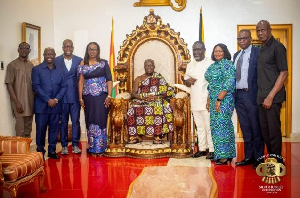- Home - News
- TWI News | TV
- Polls
- Year In Review
- News Archive
- Crime & Punishment
- Politics
- Regional
- Editorial
- Health
- Ghanaians Abroad
- Tabloid
- Africa
- Religion
- Election 2020
- Coronavirus
- News Videos | TV
- Photo Archives
- News Headlines
- Press Release
General News of Monday, 8 December 2003
Source: gna.
Journalists asked to adopt new approach to reporting
Professor Kwesi Jonah, a Fellow of the Institute of Economic Affairs (IEA) on Monday said parliamentary Journalists would only facilitate good governance in the country if they adopted a systemic, critical, two way communication and advocacy approach to their reportage on the work of Parliament.
He noted that the current approach to parliamentary reporting only presented to the public the facts of what happens on the floor of the House, adding that such an approach denied the constituents of the various members of Parliament from knowing in detail, what their representatives in Parliament were doing.
"As parliamentary reporters we must go beyond the facts and tell the public what produces the facts, if our reportage must promote good governance," he said.
Prof. Jonah made these remarks at a day's training workshop on good governance for the Parliamentary Press Corps, under the theme: Opportunities and Challenges in Promoting Good Governance.
The Workshop, sponsored by the Integrated Social Development Centre (ISODEC) was attended by the Speaker of Parliament Mr. Peter Ala Adjetey, Majority Leader Felix Owusu-Agyepong and Mr. Kofi Attoh, NDC- Ho Central.
Speaking on the topic, "The role of the Parliamentary Reporter in Promoting Good Governance", Prof. Jonah noted that it was imperative for the populace to understand the systems and structures that govern the work of Parliament in order to have a better understanding of the results of their work.
"It is important, for instance for the Parliamentary reporter to be able to explain to the public that Ghana operates a unitary Legislature where, unlike in a federal and bi-camera system, the majority in parliament has the power to bulldoze bills into laws in spite of stiff opposition from the minority," he said.
Prof. Jonah said in that regard, it was not enough to report the fact that a particular law was passed after such and such a vote on the floor of the House, without making the populace understand that it was only possible because of the kind of system the legislature operates.
Prof. Jonah said the public has the right to know the whole truth about the structures and systems of governance in the country and their consequence in order to be able to participate effectively in the democratisation and governance process.
He also noted that the social and economic systems prevailing in the country puts pressure on the Members of Parliament, especially when they go to their constituencies.
Prof. Jonah explained that the social system, whereby everybody saw the MP as a father figure and therefore, goes to the MP for financial, material and other forms of supports is only a consequence of the cultural system of belongingness in the country, adding that economic hardship and high general poverty level was also a factor.
These he said must feature in the new approach of parliamentary reporting to put the concerned institutions on their toes to work at resolving such issues in the proper manner. He said the parliamentary journalists must also be bold to criticize the failures of parliament as a body, adding that the rampant lack of quorum due to absenteeism and lateness, unnecessary boycotting, throwing of soft punches at ministers during question times, asking unnecessary questions, among others, were issues that journalists must regularly criticize.
Prof. Jonah noted that budget statement and other financial documents presented on the floor of the house, were often not critically and thoroughly analysed before approval, adding that better critical analysis of such document were often done by civil society organizations like ISODEC, IEA and others only after those documents were passed.
"Parliamentary reporters must do a critical examinations of the debate that goes on in the House on budgets and other financial statement to ensure that MPs do what their constituents elected them to do," he said.
He said as Parliamentary journalists report what the MPs were doing for the constituents, they must also create an opportunity for the constituents to tell the MPs what they (the constituents) felt about their MPs.
Prof. Jonah said Parliamentary Journalists also have the responsibility to play an advocacy role for parliament as a whole, adding that there were several conditions that impede the work of parliament and these conditions need to be highlight in the media so they could be addressed.
"It is common knowledge that our parliament lack adequate logistics, administrative back up, research assistance and committee meeting rooms, and the MPs lack personal assistances and secretaries and other necessary facilities and conditions to make them work efficiently," he said. "Parliamentary Journalists must highlight these things regularly." He said it was also important that in the interest of good governance, newly elected MPs were taken through orientation courses to make them abreast with the work of Parliament.
Mr. Vitus Azeem, a Budgetary and Taxation Systems Expect from ISODEC, in a lecture on The Budgetary Process, called on Journalists to commit themselves to critical reading and analysis of annual budget in order to make informed and critical contribution to the debate on budgets.
He noted that MPs usually took partisan stance on irrelevant issues, but when it came to budgetary and other financial issues where they would benefit as individuals, they usually vote unanimously, adding that this was the time journalists must do a critical analysis of their actions.
On the issue of the rampant lack of quorum in parliament, he said Journalists could take the opportunity to report on how it is affecting business in the House and advocate for an amendment in the constitution to disallow the President from choosing his Minister from Parliament.
Mr. Azeem asked journalists to closely monitor budgetary allocations, loans, HIPC funds distribution and other funds approved by parliament so that they are used judiciously.
"Parliamentary Journalists must also be able monitor the ruling party's campaign promises and compare them to their application of funds and budgetary allocations and inform the public whether the government is fulfilling its campaign promises or not.
"You should also monitor whether the various ministries and state institutions receive their full budgetary allocations by the close of every financial year, for the public to know whether the government is not just throwing dust in the eyes of the public."
The workshop was attended by about 40 Parliamentary Reporters.










